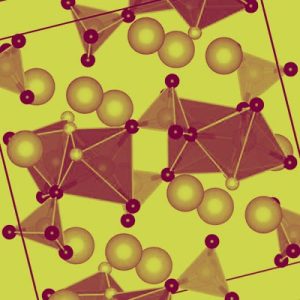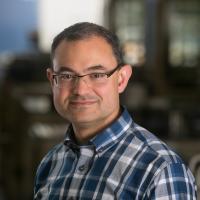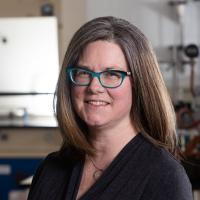 Our research focuses on both soft (biological and polymers) and hard materials. This may mean improving current materials or preparing new high-performance ones, optimizing existing characterization tools and developing new tools. Applications of our work include are improved lithium ion batteries for energy storage, fuel cells for power generation, polymers for medical and electronic applications, radiopharmaceuticals for cancer screening and treatment, biocompatible hydrogels for drug delivery, catalysts and semiconductors, materials for magnetic cooling and waste heat recovery, functional optical materials, and water sensors.
Our research focuses on both soft (biological and polymers) and hard materials. This may mean improving current materials or preparing new high-performance ones, optimizing existing characterization tools and developing new tools. Applications of our work include are improved lithium ion batteries for energy storage, fuel cells for power generation, polymers for medical and electronic applications, radiopharmaceuticals for cancer screening and treatment, biocompatible hydrogels for drug delivery, catalysts and semiconductors, materials for magnetic cooling and waste heat recovery, functional optical materials, and water sensors.
Areas of specialty:
- Radiopharmaceuticals
- Polymers and optical materials
- Batteries for energy storage
- Catalysts and semiconductors
- Hydrogels for drug delivery
- Magnetic cooling and thermoelectrics
Our Researchers:
Alex Adronov
Professor
Research focuses on:Polymer Chemistry of Nanotubes; Dendrimer-Based Therapeutics; Covalent Functionalization of Single-Walled Carbon Nanotubes (SWNTs); SupramolecularFunctionalization of SWNTs; Dendrimer-Based Imaging Agents
Current research projects can be separated into two main areas, including the polymer chemistry of carbon nanotubes, and dendrimer-based therapeutics. In the former, both covalent and non-covalent carbon nanotube functionalization strategies are being explored, with a focus on producing functional materials that combine the properties of carbon nanotubes with those of other nano-scale structures. In the area of dendrimer-based therapeutics, the emphasis is on the development and investigation of simultaneous diagnostic imaging and drug delivery agents.
Michael Brook
Professor Emeritus, Faculty of Science Chair in Sustainable Silicone Polymers
Research focuses on:Synthesis to make silicones more sustainable: controlling biological and interfacial properties by incorporating natural materials, new routes to recycle automotive tires, development of strategies to create precise silicones with precise properties

Michael Brook
Professor Emeritus, Faculty of Science Chair in Sustainable Silicone Polymers
Katherine Bujold
Assistant Professor
Research focuses on:DNA Nanotechnology, Supramolecular DNA Assembly, Spherical Nucleic Acids, Chemical Biology
Gillian Goward
Professor
Research focuses on:Magnetic Resonance Spectroscopy and Imaging of Materials for Alternative Energy Storage & Conversion; Lithium Ion Batteries & Fuel Cells
Our research group aims to apply advanced solid-state nuclear magnetic techniques, in combination with electrochemical characterisation, to the study of materials of interest as chemical power sources. Lithium ion batteries and proton exchange membrane fuel cells (PEM-FC) provide environmentally friendly energy alternatives. Emerging technologiesinclude sodium ion batteries, and sodium/lithium-air batteries, which are exciting, but so far poorlyunderstood & controlled. Solid-state NMR is well known for its ability to provide site-specific information on structure and dynamics. Weutilise multi-nuclear approaches including 7Li, 6Li, 23Na, and 1H, to investigate processes and interactions such as electrochemical transport, ionic conductivity,hydrogen-bonding,and polymer chain ordering or mobility. In recent years, the field of magnetic resonance has experienced rapid technological and methodological growth, allowing a broader range of materials questions to be addressed.
Peter Kruse
Professor, Associate Chair (Graduate Studies)
Research focuses on: Surfaces, interface and low-dimensional materials; their electronic and chemical properties; doping, mobility and pattern formation; applications in corrosion inhibitors and water quality sensors
Jose Moran-Mirabal
Professor, University Scholar, Associate Chair (Research)
Research focuses on:Micro- and nanostructured materials fabrication and applications; nanocellulose surface chemistry; 3D printing; biosensors; super-resolution fluorescence microscopy, biomolecular interactions

Jose Moran-Mirabal
Professor, University Scholar, Associate Chair (Research)
Yurij Mozharivskyj
Professor
Research focuses on: Thermoelectric materials; inorganic phosphors for temperature sensing
Kalaichelvi Saravanamuttu
Professor
Research focuses on:Sol-gel chemistry; self-assembly; photonics and photo-induced transformations
Harald Stover
Professor
Ignacio Vargas-Baca
Professor
Research focuses on:Supramolecular Main-Group Chemistry: New Materials and Functional Multimolecular Assemblies
Ryan Wylie
Associate Professor, Acting Director of Chemical Biology (Graduate Studies)
Research focuses on: Delivery vehicles, controlled release, immunotherapeutics, immune-directing polymer coatings
The Wylie Lab develops protein-polymer conjugates for:
1. Delivery of biologics, primarily polymer-antibody conjugates, for applications in cancer immunotherapy and degenerative retinal diseases
2. Bioreactors to modulate blood chemistry towards the treatment of sepsis
3. Bio-inks for the 3D printing of tissues to improve drug screening efficiency
Please visit wylielab.com for more information.

Ryan Wylie
Associate Professor, Acting Director of Chemical Biology (Graduate Studies)
Alex Adronov
Professor
Research focuses on:Polymer Chemistry of Nanotubes; Dendrimer-Based Therapeutics; Covalent Functionalization of Single-Walled Carbon Nanotubes (SWNTs); SupramolecularFunctionalization of SWNTs; Dendrimer-Based Imaging Agents
Current research projects can be separated into two main areas, including the polymer chemistry of carbon nanotubes, and dendrimer-based therapeutics. In the former, both covalent and non-covalent carbon nanotube functionalization strategies are being explored, with a focus on producing functional materials that combine the properties of carbon nanotubes with those of other nano-scale structures. In the area of dendrimer-based therapeutics, the emphasis is on the development and investigation of simultaneous diagnostic imaging and drug delivery agents.
Alex Adronov
Professor
Research focuses on:Polymer Chemistry of Nanotubes; Dendrimer-Based Therapeutics; Covalent Functionalization of Single-Walled Carbon Nanotubes (SWNTs); SupramolecularFunctionalization of SWNTs; Dendrimer-Based Imaging Agents
Current research projects can be separated into two main areas, including the polymer chemistry of carbon nanotubes, and dendrimer-based therapeutics. In the former, both covalent and non-covalent carbon nanotube functionalization strategies are being explored, with a focus on producing functional materials that combine the properties of carbon nanotubes with those of other nano-scale structures. In the area of dendrimer-based therapeutics, the emphasis is on the development and investigation of simultaneous diagnostic imaging and drug delivery agents.
Michael Brook
Professor Emeritus, Faculty of Science Chair in Sustainable Silicone Polymers
Research focuses on:Synthesis to make silicones more sustainable: controlling biological and interfacial properties by incorporating natural materials, new routes to recycle automotive tires, development of strategies to create precise silicones with precise properties
Michael Brook
Professor Emeritus, Faculty of Science Chair in Sustainable Silicone Polymers
Research focuses on:Synthesis to make silicones more sustainable: controlling biological and interfacial properties by incorporating natural materials, new routes to recycle automotive tires, development of strategies to create precise silicones with precise properties
Katherine Bujold
Assistant Professor
Research focuses on:DNA Nanotechnology, Supramolecular DNA Assembly, Spherical Nucleic Acids, Chemical Biology
Katherine Bujold
Assistant Professor
Research focuses on:DNA Nanotechnology, Supramolecular DNA Assembly, Spherical Nucleic Acids, Chemical Biology
Gillian Goward
Professor
Research focuses on:Magnetic Resonance Spectroscopy and Imaging of Materials for Alternative Energy Storage & Conversion; Lithium Ion Batteries & Fuel Cells
Our research group aims to apply advanced solid-state nuclear magnetic techniques, in combination with electrochemical characterisation, to the study of materials of interest as chemical power sources. Lithium ion batteries and proton exchange membrane fuel cells (PEM-FC) provide environmentally friendly energy alternatives. Emerging technologiesinclude sodium ion batteries, and sodium/lithium-air batteries, which are exciting, but so far poorlyunderstood & controlled. Solid-state NMR is well known for its ability to provide site-specific information on structure and dynamics. Weutilise multi-nuclear approaches including 7Li, 6Li, 23Na, and 1H, to investigate processes and interactions such as electrochemical transport, ionic conductivity,hydrogen-bonding,and polymer chain ordering or mobility. In recent years, the field of magnetic resonance has experienced rapid technological and methodological growth, allowing a broader range of materials questions to be addressed.
Gillian Goward
Professor
Research focuses on:Magnetic Resonance Spectroscopy and Imaging of Materials for Alternative Energy Storage & Conversion; Lithium Ion Batteries & Fuel Cells
Our research group aims to apply advanced solid-state nuclear magnetic techniques, in combination with electrochemical characterisation, to the study of materials of interest as chemical power sources. Lithium ion batteries and proton exchange membrane fuel cells (PEM-FC) provide environmentally friendly energy alternatives. Emerging technologiesinclude sodium ion batteries, and sodium/lithium-air batteries, which are exciting, but so far poorlyunderstood & controlled. Solid-state NMR is well known for its ability to provide site-specific information on structure and dynamics. Weutilise multi-nuclear approaches including 7Li, 6Li, 23Na, and 1H, to investigate processes and interactions such as electrochemical transport, ionic conductivity,hydrogen-bonding,and polymer chain ordering or mobility. In recent years, the field of magnetic resonance has experienced rapid technological and methodological growth, allowing a broader range of materials questions to be addressed.
Peter Kruse
Professor, Associate Chair (Graduate Studies)
Research focuses on: Surfaces, interface and low-dimensional materials; their electronic and chemical properties; doping, mobility and pattern formation; applications in corrosion inhibitors and water quality sensors
Peter Kruse
Professor, Associate Chair (Graduate Studies)
Research focuses on: Surfaces, interface and low-dimensional materials; their electronic and chemical properties; doping, mobility and pattern formation; applications in corrosion inhibitors and water quality sensors
Jose Moran-Mirabal
Professor, University Scholar, Associate Chair (Research)
Research focuses on:Micro- and nanostructured materials fabrication and applications; nanocellulose surface chemistry; 3D printing; biosensors; super-resolution fluorescence microscopy, biomolecular interactions
Jose Moran-Mirabal
Professor, University Scholar, Associate Chair (Research)
Research focuses on:Micro- and nanostructured materials fabrication and applications; nanocellulose surface chemistry; 3D printing; biosensors; super-resolution fluorescence microscopy, biomolecular interactions
Yurij Mozharivskyj
Professor
Research focuses on: Thermoelectric materials; inorganic phosphors for temperature sensing
Yurij Mozharivskyj
Professor
Research focuses on: Thermoelectric materials; inorganic phosphors for temperature sensing
Kalaichelvi Saravanamuttu
Professor
Research focuses on:Sol-gel chemistry; self-assembly; photonics and photo-induced transformations
Kalaichelvi Saravanamuttu
Professor
Research focuses on:Sol-gel chemistry; self-assembly; photonics and photo-induced transformations
Harald Stover
Professor
Harald Stover
Professor
Ignacio Vargas-Baca
Professor
Research focuses on:Supramolecular Main-Group Chemistry: New Materials and Functional Multimolecular Assemblies
Ignacio Vargas-Baca
Professor
Research focuses on:Supramolecular Main-Group Chemistry: New Materials and Functional Multimolecular Assemblies
Ryan Wylie
Associate Professor, Acting Director of Chemical Biology (Graduate Studies)
Research focuses on: Delivery vehicles, controlled release, immunotherapeutics, immune-directing polymer coatings
The Wylie Lab develops protein-polymer conjugates for:
1. Delivery of biologics, primarily polymer-antibody conjugates, for applications in cancer immunotherapy and degenerative retinal diseases
2. Bioreactors to modulate blood chemistry towards the treatment of sepsis
3. Bio-inks for the 3D printing of tissues to improve drug screening efficiency
Please visit wylielab.com for more information.
Ryan Wylie
Associate Professor, Acting Director of Chemical Biology (Graduate Studies)
Research focuses on: Delivery vehicles, controlled release, immunotherapeutics, immune-directing polymer coatings
The Wylie Lab develops protein-polymer conjugates for:
1. Delivery of biologics, primarily polymer-antibody conjugates, for applications in cancer immunotherapy and degenerative retinal diseases
2. Bioreactors to modulate blood chemistry towards the treatment of sepsis
3. Bio-inks for the 3D printing of tissues to improve drug screening efficiency
Please visit wylielab.com for more information.








